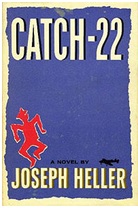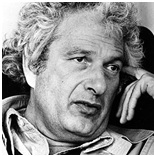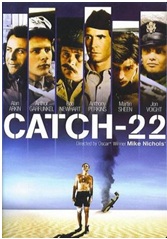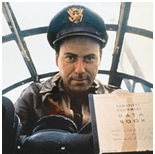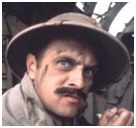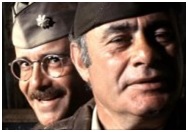|
 |
|
 |
|
|
||
Catch-22 - People and Management
Catch-22 (1961) A World War Two novel by the American, Joseph Heller (1923-99), pictured right below.
Fun facts • Catch-22 has become part of the English language. The Oxford English Dictionary defines it as: “a difficult situation from which there is no escape”. • Made into a 1970 film.
Key characters (John) Yossarian, Air Force captain and the novel’s hero Milo Minderbender, mess officer (in charge of food) in Yossarian’s division Doc Daneeka, the medical officer The chaplain, Yossarian’s friend Colonel Cathcart, Yossarian’s ambitious boss
The story During the second half of the Second World War, Yossarian leads his Air Force squadron on the island of Pianosa near the Italian coast. They are exploited by their inhumane and ambitious superior officers who give them so many missions that no one gets home for leave. Having a strong desire to live, Yossarian is furious that his life is constantly in danger through no fault of
his own. He loses all his desire to fight, when a young gunner, Snowden, dies a bloody death in
his arms. He is disgusted by:
Yossarian is continually looking for ways to get out of the war and discovers that insanity is one way of doing this. But a Catch-22 traps him in the Air Force: by claiming he is insane, he proves his is obviously sane, because any sane person would claim insanity to avoid flying bombing missions. Yossarian is badly affected by the death of his friend, Nately. So he refuses to fly any more missions and is eventually arrested wandering the streets of Rome without a pass. His superior officers, Colonels Cathcart and Korn, give him a choice:
Although tempted by the offer, he refuses because it will endanger innocent people’s lives. So he decides to desert and flee to neutral Sweden, trying to regain his humanity lost in the war.
Lessons for management 1. Paradox is possible Paradox (or conflicting alternatives) is central to a Catch-22. For example, Yossarian (Alan Arkin, pictured right, in the film) is concerned about people, but the war is forcing him to kill them.
2. Believe in something worthwhile Yossarian wants to survive (avoiding danger whenever possible) and be free, untainted by the horror of war that challenges people’s (even the chaplain’s) faith in God. Yossarian is an atheist, disillusioned by Colonel Cathcart’s constant use of religion to further his own ambition. In an amusing discussion with another atheist, Mrs Scheisskopf, Yossarian says that an all powerful, loving God would never have created phlegm, tooth decay and human suffering. But he still has morals, choosing to desert rather than betray his squadron.
3. Objectives are important The Air Force doesn’t have clear and worthwhile objectives to inspire its aircrews. They are told it is more important to take good aerial photographs of explosions than to destroy their targets. The chaplain is even questioned for a crime that is unknown to his interrogator!
4. Bureaucracy can be barmy The Air Force’s officers make some really stupid decisions. For example:
People’s powerlessness in the face of such barmy bureaucracy is summed up by an old Italian woman in a Catch-22: “They have a right to do anything we can’t stop them from doing”.
5. Care about people Unlike Yossarian, his superior officers (Colonels Cathcart and Korn, pictured right in the film):
6. Don’t be distracted by trivialities People's performance suffers because of:
a) riduculous reasons for promotion Lieutenant Scheisskopf (shithead in German) is eventually promoted to general because of his passion for military parades.
b) ignoring what's important In his interrogation of an ideal officer (Clevinger), Scheisskopf doesn’t let him prove his innocence, because he’s too busy correcting his way of speaking.
7. Principle before profit Minderbender (Jon Voight, pictured right, in the film) shows that business can be immoral through his:
8. Recognize and develop talent Scheisskopf didn’t like Clevinger, because his cleverness showed up his own incompetence.
9. Listen to people Don’t be like:
Key quote on war It doesn't make a damned bit of difference who wins the war to someone who's dead.
Key quote on success He was a self-made man who owed his lack of success to nobody (on Colonel Cargill) Some men are born mediocre, some men achieve mediocrity, and some men have mediocrity thrust upon them (about Major Major)
Key quote on empowerment Clevinger had a mind, and Lieutenant Scheisskopf had noticed that people with minds tended to get pretty smart at times. Such men were dangerous...
Key quote on decision making Colonel Cathcart was indefatigable that way, an industrious, intense, dedicated military tactician who calculated day and night in the service of himself
Key quote on justice Justice is a knee in the gut.
Key quotes on health Everything worth dying for is certainly worth living for, an old man. Yossarian owed his good health to exercise, fresh air, teamwork and good sportsmanship; it was to get away from all that he had first discovered the hospital
Key quote on sex There was little she hadn’t tried and less she wouldn’t (talking about Dori Duz, a friend of Lieutenant Scheisskopf's wife)
Key quote on management Colonel Cathcart had courage and never hesitated to volunteer his men for any target available.
Two literature websites to recommend 1. sparknotes.com 2. litcharts.com |
|
|
||
|
|
||
| Copyright © wisdomtowin.com 2025 All Rights Reserved | ||
|


